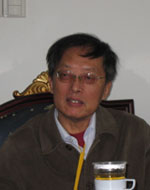
Rodger Martin
罗杰-马丁
  Rodger Martin is an editor, a teacher, a poet, a mentor of students, and a journalist. He has published Paradise Lost adapted for Dramatic Reading: co-editor B. Eugene McCarthy. (Keene State College, 2014), The Battlefield Guide, (Brookline, N.H.: Hobblebush Books, 2009) and The Blue Moon Series, (Brookline, N.H.: Hobblebush Books, 2006). He served as the editor of The Worcester Review during 1986 to 2012 and is currently the co-editor of The Granite State Poetry Series. He lives in Hancock, New Hampshire. Rodger Martin is an editor, a teacher, a poet, a mentor of students, and a journalist. He has published Paradise Lost adapted for Dramatic Reading: co-editor B. Eugene McCarthy. (Keene State College, 2014), The Battlefield Guide, (Brookline, N.H.: Hobblebush Books, 2009) and The Blue Moon Series, (Brookline, N.H.: Hobblebush Books, 2006). He served as the editor of The Worcester Review during 1986 to 2012 and is currently the co-editor of The Granite State Poetry Series. He lives in Hancock, New Hampshire.
罗杰·马丁(Rodger Martin,1948-):出生在宾夕法尼亚州阿米什农村,在英国度过童年。1966年参加侵越战争,1967年负伤后复员。获宾州米勒维尔大学学士(1972)和新罕布什尔州基恩学院硕士(1979),毕业后留校教新闻学。他先任教于基恩州立学院,教授新闻学,兼任全国教育协会和诗歌基金会诗歌对话练习新罕布什尔州项目主任。1986年以来,任诗歌杂志《伍斯特评论》(The Worcester Review)主编。新罕布什尔州艺术委员会委员。出版的诗集除上述《葛底斯堡》外,还有《尼莫诗篇:火星人视角》(The Nemo Poems: A Martian Perspective,1992)、《蓝月系列诗》(The Blue Moon Series,2007)和《战场指南》(The Battlefield Guide, 2010)。他的诗歌、小说和研究密尔顿《失乐园》的论文获阿巴拉契亚诗歌奖(1998)和新罕布什尔州艺术委员会颁发的小说奖(1990)以及两次获国家人文基金资助奖(1990,2001)、两次获新罕布什尔州艺术委员会颁发的新作品奖(1998,2001)。
|

|

译者
Translator
张子清
Ziqing Zhang
 
张子清是南京大学外国文学研究所教授,北京外国语大学华裔美国文学研究中心客座研究员。哈佛-燕京访问学者(1982-83),美国富布莱特访问学者(1993-94)。中国作家协会会员、全国美国文学研究会常务理事、中国比较文学学会会员。代表作:《20世纪美国诗歌史》(1995,1997)。主编 “华裔美国小说丛书”(译林出版社)、“西方人看中国丛书”(南京出版社)。
Ziqing Zhang is professor of Institute of Foreign Literature, Nanjing University, Nanjing, guest research Fellow of Chinese American Literature Research Center, Beijing University of Foreign Studies, Beijing. He was a visiting scholar as a post-doctoral fellow at Harvard University from 1982 to 1983 and Fulbright Scholar at Harvard University and The University of California at Berkeley from 1993 to 1994. His works include A History of 20th Century American Poetry (1995, 1997), Selected Poems of T.S.Eliot (1985), Selected American Poems (1993) and Birthday Letters by Ted Hughes (1998). He has co-authored Two Sides of the Globe: Contemporary Chinese and American Literatures and Their Comparison (1993) and On American New Pastoral Poems (2006). He has received many awards including The First Prize of Humanities Research Science Foundation of Nanjing University in 1998.
|
The air breathes clearer up here
as we peer over a weathered edge
into a caldera so primordial
even the dinosaur had yet to gleam
in the evolutionary eye.
This is the rim of something larger—
an ancient Vulcan in a spleen—who
blew out his side to level all below
beneath ash and super-heated pumice.
And here, above the low mists
that snake in from the Yangtze,
we walk the mottled paths between
the ranks of tea, all bursting green
in the May sunshine, enough
to launch whatever imaginary craft
sails the wonder that brought us here.
|
|
我们进入火山口边缘时的空气
变得清晰而爽朗,这饱经风霜之处
是如此的原始,在进化的眼睛里
甚至那时恐龙都还没有出现。
这是更大范围的边缘,
发怒的火神吹灭了他身旁的一切,
拉平超热的火山灰和浮石。
这里高于从长江曲折来的迷雾,
我们在一行行茶树之间
斑驳的田里行走,一切
在五月的阳光下显得碧绿,
足以扬起想象中精巧的风帆,
这个把我们带来此地的奇迹。
|
Water softens everything: iron,
green tea grown at the edge
of Jurong’s caldera, the boat girl singing
ballads older than the gondolier,
and a dry tongue. Like trees soften lines
of building, water reduces the critic
to the taste of fresh mellon. Even the re-imaged
Ming village, its labyrinthine alleys,
becomes a calligraphy Li Po might recognize.
A child in China is a child in Ghana is a child in Kansas
and the bellows of the bluster-priests
like wind howling in a tunnel, like a rain man
in the Panhandle, cannot make water
other than what it is.
|
|
水使一切变得柔和:软化铁,
使句容死火山口边缘的绿茶
变柔和,使船姑娘唱的民歌——
比贡多拉船夫唱的还古老的民歌
变柔和,使人们解渴。
像树使建筑物线条变柔和一样,
水把挑剔者的犀利减轻
到新鲜甜瓜的甜度。
甚至重新想象的明代村庄
连带它弯弯曲曲的小巷
变成了李白会认识的书法。
中国的加纳的堪萨斯的儿童都一样,
喧嚷的鼓吹者咆哮就像隧道里的风,
也像在锅柄状地带骗钱求雨的雨人,
不能把水制造成其它的东西。
|







